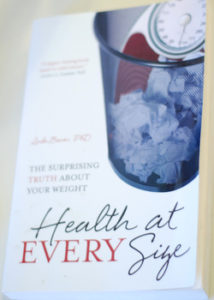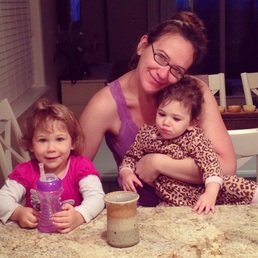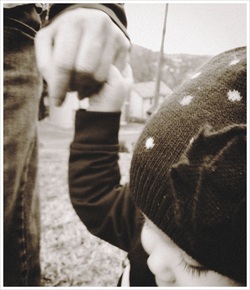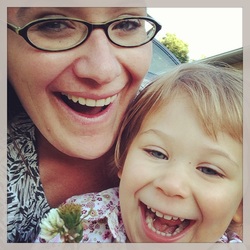
“Well, that’s ridiculous,” I told my husband. “You are so healthy. I’m guessing you’re healthier than many people you work with!”
Still, plug in those numbers and suddenly he’s overweight? I probably am too for that matter, but I don’t play numbers games. At least not those kinds. How about these kinds of number games for you? The use of BMI to dictate whether you’re normal, overweight or obese has been based on ranges, which have changed. They used to be higher. They had a little more room for oh, I don’t know, bodily differences?! They, the infamous “they”, decided to make the cutoff 25 for normal. So if your BMI is over 25, you’re overweight. What made them decide this? Was it science? One might think, but no. It was politics. The International Obesity Task Force (IOTF) drafted the new numbers and the IOTF is funded by (cue the music) weight-loss drug makers Hoffman-La Roche (of Xenical) and Abbott Laboratories (of Meridia). Ta-daaaaah. Not so scientific at the end of the day, is it?
So now you have this number, your BMI, that is used to dictate how fat you are, which is supposed to tell employers and insurance companies how much of a health risk you are and it’s not even scientifically based! Worse than that is the idea that we have an obesity epidemic in America and obesity is killing people. Sigh. I’m shaking my head, in case you couldn’t see. The majority of studies actually state that overweight people live longer than those of “normal” weight. Makes you want to rethink that “normal” number again, doesn’t it? Especially if “normal” equals a shorter life.
Take your BMI and throw it out. Tell your physicians that this number has no representative value of your health. Tell them that you eat organic food, lots of fruits and vegetables and live an active life. Then watch their eyes glaze over. They’ve bought into these myths just like most of America. Obesity doesn’t equal disease, or even death. Are you surprised? Do you assume, like most people, that the heavier you are the more likely you are to be sick with various diseases? It’s just not true. Ask me and I’ll give you TONS of research to support my statement. I just don’t want to bore you with studies if you don’t want them.
Just because there are associations between two things does not mean there is causality. Question everything. Is it possible that those defined as obese have shorter life spans because constant dieting damaged their blood vessels? One cycle of weight loss followed by weight gain can damage blood vessels, increasing the risk for cardiovascular disease. Many of these “obese” people being associated with earlier deaths are among ethnic minorities and lower socioeconomic status, which is also associated with pollution and lack of access to medical care. Most interesting is that larger people in other countries are not exhibiting the diseases that we associate obesity with. The countries where these healthier “obese” people reside are countries that haven’t placed a huge stigma on weight. The stigma we’ve created around weight has increased our stress around weight and stress is a risk factor for so many diseases (including cardiovascular disease and diabetes). So is it weight or stress that is “causing” these diseases?
To think, BMI is a fabricated equation created to serve political purposes that can effect what level of care you receive? That weight is this number you’re supposedly in control of? (You’re not, by the way.) You are not a machine: calories in, calories out. Your mind and how you think about yourself and how much stress you carry about your weight or life in general are far more powerful than a number. This is why I don’t accept weight loss clients. It’s not a goal I wish to try to help someone achieve. Weight loss may come naturally with certain dietary and lifestyle changes, but weight is not the be all end all of health. Losing weight just to be thinner will probably do more damage in the long run. Real changes for real people who are living real lives – that’s more fulfilling than crunching numbers and prescribing diets that aren’t going to feed someone’s soul.
It’s just not as simple as “they’re” making it out to be. If the real truth is to be told, it’s our thoughts, ideas and feelings surrounding weight that are killing us. Not the weight itself. Take a deep breath, trust your body and your weight. Strive for health and happiness and peace and joy. These things may sound fluffy and powerless, but frankly, they’re easier to attain than a perfect BMI. Now if only we can get health care providers and employers to recognize this…
Much of what I’ve stated here is information gleaned from Linda Bacon, PhD in her book Health at EVERY Size. As the summary says on the back of her book, “Fat isn’t the problem. Dieting is the problem. A society that rejects anyone whose body shape or size doesn’t match an impossible ideal is the problem. A medical establishment that equates ‘thin’ with ‘healthy’ is the problem.”
If you’re hungry for more, just ask!

 Disordered eating is not just about eating disorders. It’s not just starving, bingeing or purging yourself. It’s restricting yourself in the name of dieting or losing a few pounds. It’s berating yourself when you “screw up” and bemoaning all the “bad” foods you ate. It’s forcing yourself to work out more later because of what you ate earlier. It’s calories in, calories out with complete disregard for the human being who has thoughts and feelings that are so much more important. Disordered eating holds you back from living.
Disordered eating is not just about eating disorders. It’s not just starving, bingeing or purging yourself. It’s restricting yourself in the name of dieting or losing a few pounds. It’s berating yourself when you “screw up” and bemoaning all the “bad” foods you ate. It’s forcing yourself to work out more later because of what you ate earlier. It’s calories in, calories out with complete disregard for the human being who has thoughts and feelings that are so much more important. Disordered eating holds you back from living.







 Change asks us to aim for the healing, not the cure, to live for the journey, not the elusive destination. There is a huge difference between healing and cures, journeys and destinations; it is an issue of quality. Taking a journey can be likened to an adventure, one that is filled with mystery and purpose. Change is such a journey.
Change asks us to aim for the healing, not the cure, to live for the journey, not the elusive destination. There is a huge difference between healing and cures, journeys and destinations; it is an issue of quality. Taking a journey can be likened to an adventure, one that is filled with mystery and purpose. Change is such a journey.